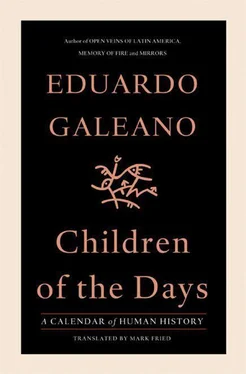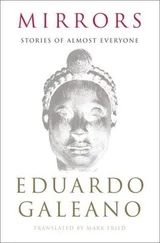Eduardo Galeano
Children of the Days: A Calendar of Human History
I cannot thank all of the friends who made this book possible or the authors of the many works I consulted. These friends and authors would not fill a stadium, but almost.
However, I can dedicate the end result to those who had the patience to read and comment on the early drafts, which yearned to be final drafts and turned out to be almost final, because there was always something to correct or change, to take out or put in: Ramón Akal, Mark Fried, Karl Hübener, Carlos Machado and Héctor Velarde.
This book is for Helena Villagra. No words needed.
— In Montevideo, at the end of the year 2011
Children of the Days: A Calendar of Human History
And the days began to walk.
And they, the days, made us.
And thus we were born,
the children of the days,
the discoverers,
life’s searchers.
— GENESIS, according to the Mayas
Today is not the first day of the year for the Mayas, the Jews, the Arabs, the Chinese or many other inhabitants of this world.
The date was chosen by Rome, imperial Rome, and blessed by Vatican Rome, and it would be an overstatement to say that all humanity celebrates today as the crossing from one year to the next.
That said, today we ought to acknowledge that time treats us rather kindly. Time allows us, its fleeting passengers, to believe that this day could be the very first day, and it gives us leave to want today to be as bright and joyous as the colors of an outdoor market.
January 2. FROM FIRE TO FIRE
On this day in 1492 Granada fell, and with it fell Muslim Spain.
Triumph of the Holy Inquisition: Granada was the last Spanish kingdom where mosques, churches and synagogues could live side by side in peace.
That same year the conquest of America began, when America was still a mystery without a name.
And in the years that followed, in distant bonfires, the same flames would consume the books of Muslims, of Jews and of America’s indigenous peoples.
Fire was the only fate for words born in hell.
January 3. MEMORY ON LEGS
On the third day of the year 47 BC, the most renowned library of antiquity burned to the ground.
After Roman legions invaded Egypt, during one of the battles waged by Julius Caesar against the brother of Cleopatra, fire devoured most of the thousands upon thousands of papyrus scrolls in the Library of Alexandria.
A pair of millennia later, after American legions invaded Iraq, during George W. Bush’s crusade against an imaginary enemy, most of the thousands upon thousands of books in the Library of Baghdad were reduced to ashes.
Throughout the history of humanity, only one refuge kept books safe from war and conflagration: the walking library, an idea that occurred to the grand vizier of Persia, Abdul Kassem Ismael, at the end of the tenth century.
This prudent and tireless traveler kept his library with him. One hundred and seventeen thousand books aboard four hundred camels formed a caravan a mile long. The camels were also the catalogue: they were arranged according to the titles of the books they carried, a flock for each of the thirty-two letters of the Persian alphabet.
January 4. LAND THAT ATTRACTS
Today in 1643, Isaac Newton was born.
Newton never had any lovers as far as we know, male or female.
Terrified of infections and ghosts, he died a virgin, touched by no one.
But this fearful man had the courage to investigate and reveal
the movement of the heavenly bodies,
the composition of light,
the speed of sound,
the conduction of heat
and the law of gravity, the earth’s irresistible force of attraction, which calls to us and by calling reminds us of our origin and our destiny.
January 5. LAND THAT SPEAKS
George Washington Carver dreamed about God.
“Ask of me whatever you wish,” God offered.
Carver asked Him to reveal the secrets of peanuts.
“Ask the peanut,” God told him.
George, a child of slaves, dedicated his life to resurrecting lands slain by the slave plantations.
In his laboratory, which looked like an alchemist’s kitchen, he developed hundreds of products made from peanuts and sweet potatoes: oil, cheese, butter, sauces, mayonnaise, soap, stains, dyes, inks, syrups, glues, talcum.
“The plants tell me,” he explained. “They’ll talk to anyone who knows how to listen.”
When he died on this day in 1943 he was nearly eighty years old and still handing out recipes and advice, still teaching in an unusual university, the first in Alabama to accept students who were black.
January 6. LAND THAT AWAITS
In the year 2009, Turkey restored the citizenship denied to Nazim Hikmet and acknowledged at last that its most beloved and derided poet was Turkish.
He could not enjoy the good news: he had died half a century earlier, in the exile that lasted much of his life.
His land awaited him, but his books were outlawed and he was too. The banished poet wished to return:
I still have things to do .
I met up with the stars, but I could not count them .
I drew water from the well, but I could not offer it .
He never returned.
January 7. THE GRANDDAUGHTER
Soledad, granddaughter of Rafael Barrett, liked to recall the words of her grandfather:
“If Good does not exist, we’ll have to invent it.”
Rafael, Paraguayan by choice, revolutionary by vocation, spent more time in jail than at home, and he died in exile.
The granddaughter was riddled with bullets in Brazil on this day in 1973.
Lance Corporal Anselmo, rebel sailor, revolutionary leader, was the one who turned her in.
Fed up with losing, repenting everything he had dreamed and desired, he named, one after another, all of his comrades in the struggle against the Brazilian military dictatorship and sent them to the torture chamber or the slaughterhouse.
Soledad, his woman, he left for last.
Lance Corporal Anselmo pointed out the place where she was hiding, and then he left.
He was already at the airport when the first shots rang out.
January 8. I WILL NOT SAY GOOD-BYE
In 1872, by order of the president of Ecuador, Manuela León was executed.
The president in his decree called Manuela “Manuel,” so there would be no evidence that a gentleman like himself was sending a woman, even a stupid Indian, to the firing squad.
Manuela had stirred up town and country, and caused the Indian masses to rise against forced labor and the payment of tribute. As if that were not enough, she also committed the impertinence of challenging Lieutenant Vallejo, a government official, to fight a duel before the astonished eyes of his soldiers, and in open combat her lance humiliated his sword.
When this, her final day, arrived, Manuela faced the firing squad without a blindfold. Asked if she had anything to say, she answered, in her language:
“ Manapi .”
Nothing.
January 9. ELEGY TO BREVITY
>
Today in Philadelphia in 1776, the first edition of Common Sense rolled off the press.
Thomas Paine, the author, maintained that independence was only common sense given the humiliation of being a colony and the ludicrous nature of hereditary monarchy, which might as easily crown an ass as a lion.
Читать дальше













